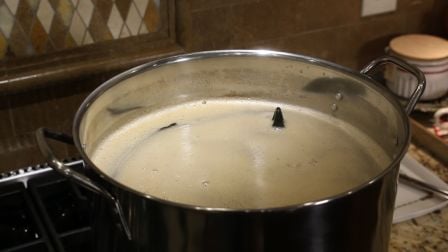
This week I take a look at what type of water is best for extract beer brewers. I make the case that distilled or RO water may be the best choice for extract brewing.
Water Chemistry for Extract Brewers
Advanced all grain brewers go through a lot of effort to get their water profiles right for their beer including choosing a water profile, adding various water salts and adjusting their mash pH to make the perfect beer.
In particular, all grain brewers try hard to make sure they are brewing with good quality water and that their mash pH is in a good range during the mash conversion step where complex starches are broken down into simpler sugars that yeast can ferment.
But what about extract brewers?
To answer that question, we first need to understand how liquid and dry malt extract is made. The process starts, much as it does for the all grain brewer, with malted barley. The malted barley is mashed using exactly the same process that an all grain brewer would use by the manufacturer. They extract wort from that process and then basically boiled to remove the water from the wort. This creates either the thick liquid syrup (Liquid Malt Extract or LME) or dry malt extract (DME).
The process to concentrate and dry the wort is done by boiling the water off, usually under a vacuum to reduce the boiling temperature. So basically rather than mashing from the grain as an all-grain brewer would do, you are paying a supplier to do that for you and then concentrate it down to a syrup or dry powder.
One important point is that the manufacturer of the extract is doing a lot of the water chemistry for you up front. They are concerned with using good quality water, matching the water to the style of beer and also making sure the mash pH is in the good range for proper sugar extraction.
So the wort they are concentrating already has the important salts in it. Removing the water leaves not only the sugars but also the various water salts behind. So the extract you purchase already has the water salts you need in the extract itself.
What Water to Use for Extract Brewing
Since the malt extract itself already has the important water treatment in it, I believe the best water to use for extract brewing is either RO or distilled water which don’t contain any significant ion/salt concentrations. If you can’t get distilled or RO water, you should probably strive to get a fairly neutral water that is low in the big six water ions.
If you are brewing a particularly hoppy or malty style you can consider playing a bit with the sulfite/chloride ratio. However I would not go crazy adding more water salts as you may not have a good measure of what is already in the malt extract.
And obviously if you are doing a partial mash, you may want to adjust the mash portion of your water to make sure it has a good balance of brewing ions in it, and it has the proper pH. This can be done in the same way all grain brewers adjust their mash water and pH.
As a final aside, please also read this article on steeping grains and astringency because it has some important tips on how much water to use if you are steeping fresh grains along with your extract brew.
Thanks for joining me on the BeerSmith Home Brewing Blog. Be sure to sign up for my newsletter or my podcast for more great tips on homebrewing.